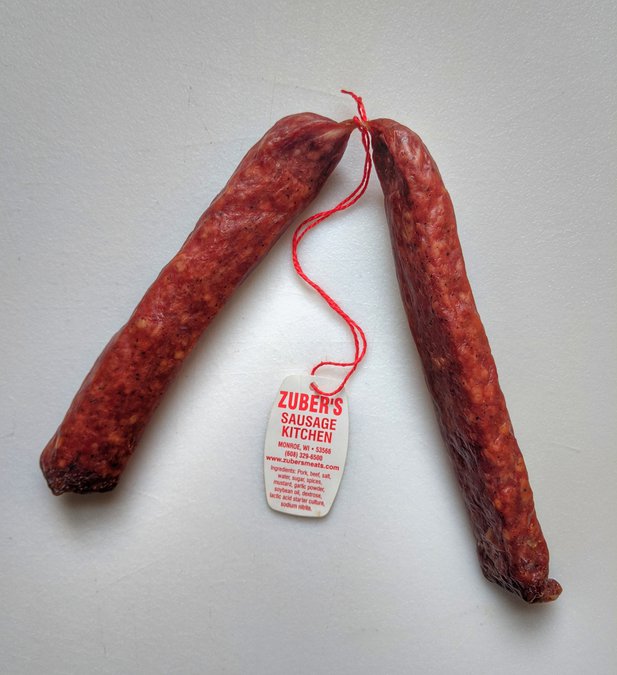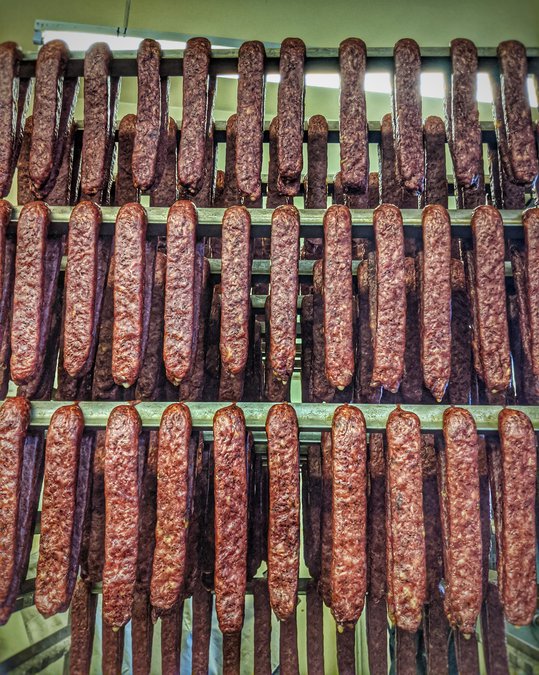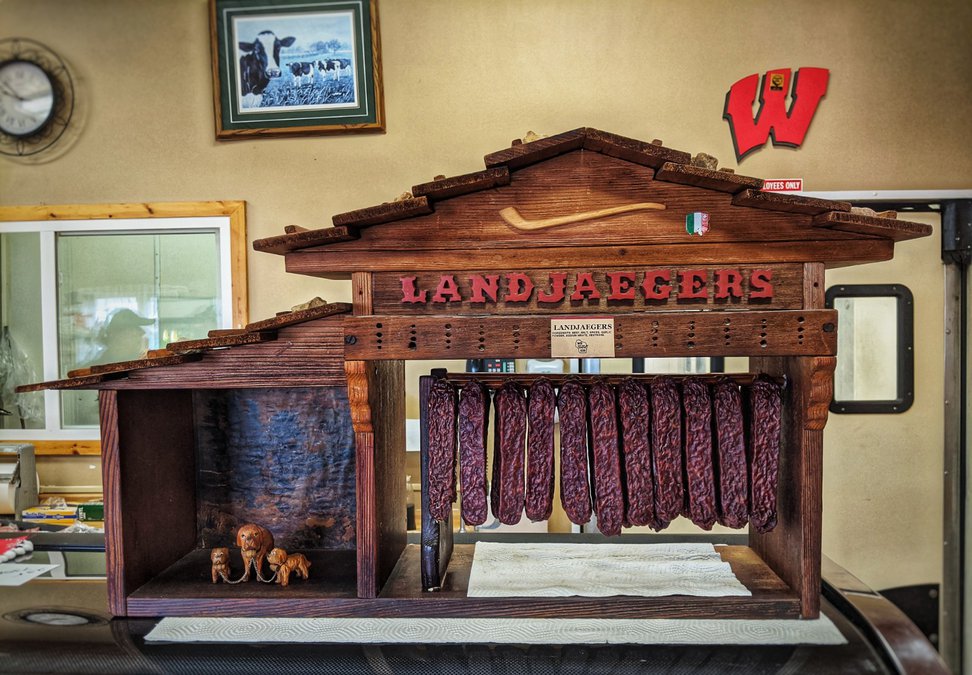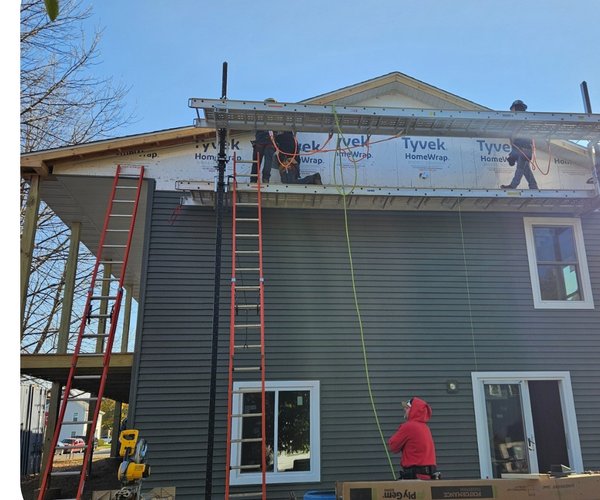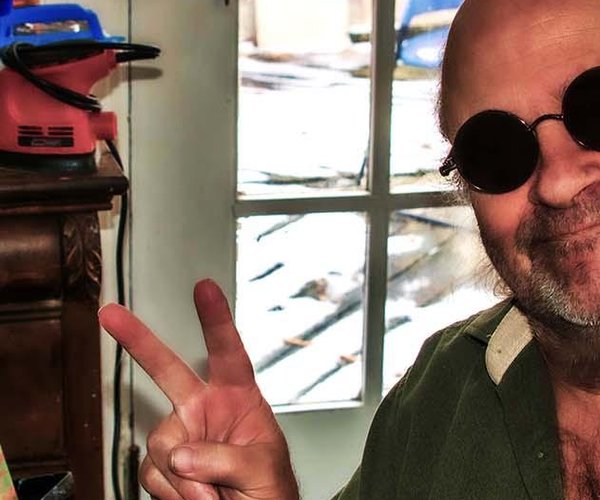What was nothing more than a tasty, uncommon treat for one local writer during his youth has turned into the topic of an entire book he has now published.
Jesse Brookstein recently completed the roughly-140-page work called A Perfect Pair: The History of Landjaeger in Green County, Wisconsin.
In January of 2020, he started his travels far and wide across the county to talk to professionals in the field to learn more about how and why they craft the popular product.
Brookstein’s interest in landjaegers arose when he was growing up in upstate New York. At the time, they were just “this meat product that [he] always loved,” since what he knew about them was limited to their identity as “really cool meat sticks.”
Brookstein got separated from landjaeger when he relocated to Colorado, but reunited with the product several years ago when he moved to Wisconsin.
Brookstein went to a local meat market, and there they were, staring right back at him from behind the bar.
He started finding more locales that sold them and went on a shopping spree, “buying one here, buying one there.”
He knew he was a fan, but wanted to learn more about the product. Much to his dismay, he couldn’t find much information.
Instead of giving up, he decided to dig deeper and began interviewing people with inside knowledge about landjaegers.
Since he found a concentration of landjaeger producers in Green County, Brookstein decided to make the region the focal point of his research, which turned into a book.
Chris Hessling is one landjaeger producer who shared his insight for A Perfect Pair. He and his wife, Nita Hessling, bought Ruef’s Meat Market in New Glarus in 2017.
They purchased the Green County Locker in Monroe in 2019. Mike Buol, the former owner, also works with them.
The Hesslings closed down the New Glarus shop in February, but acquired a Monroe-based retail space in April that they are currently preparing to open a meat market in.
Chris, previously a chef, learned about the history of landjaeger from Willy Ruef, who owned Ruef’s Meat Market from 1966 until his son, Bill Ruef, took over, Chris said.
“I wanted to kind of go back in time and crack open Willy’s old recipe book,” upon buying the shop from Bill, Chris said.
Though he hopes to experiment with new flavors in the future — considering options that range from Door County cherry to cranberry to garlic — he is still making the landjaeger the old-fashioned way, which takes around 7-10 days per batch, Chris said, depending on how much time the meat sticks need to reach the proper pH and water activity levels.
The basic landjaeger-making process starts with producers combining a meat mixture with sugar, salt and curing agents. They put the ingredients into casings, which they place in forms that give them a flattened shape, Brookstein said.
Sheets of forms are stacked and left to ferment. After that, the meat sticks hang in a smokehouse until reaching a certain temperature to kill off bacteria.
Finally, they are left to dry, Brookstein added, resulting in a shelf-stable snack.
A starter culture or citric/lactic acid might speed up the process, but “it changes the product,” Chris said, so he doesn’t use them, as he is trying to keep traditions of the past alive.
Getting them to pass modern-day food inspections required buying lab equipment so he could test every batch for safety purposes. Other than that new equipment, “everything involved in making the landjaegers — from the grinder, the mixer, the stuffer, the little metal jig that I use to press them out — all of that is the same equipment that Willy used years ago … that his son used after him,” Chris said.
His goal is to preserve 100 years of history, he said, noting that he has even transported the original chopper and smoker to their new site.
Brookstein’s book aims to share that history through compiling information from people like Chris, since “if someone doesn’t document it, it’s just lost to time.”
He found during his research that many family-owned meat shops have been shutting down over the years.
“Families don’t want to take (them) over,” he said. “It’s hard work. It doesn’t really pay the bills sometimes...”
Brookstein is now focusing his full-time efforts on keeping this industry thriving.
He just transitioned into an Outreach Specialist position at the University of Wisconsin—Madison Meat Science & Animal Biologics Discovery building, where he will be organizing and hosting workshops and short courses. A large part of his new role involves a two-year Master Meat Crafter program, which provides comprehensive knowledge of meat science, food safety and meat processing principles to both industry veterans and next-generation processors.
The position opened up in Dr. Jeff Sindelar’s department as Brookstein was working on his book. Sindelar just so happened to be one of the individuals Brookstein had interviewed for it.
Brookstein’s book, too, is keeping the memory of the landjaeger tradition alive.
It is now available for purchase on the website he runs to distribute books that he and other local authors have written at https://www.
karatefightpublishing.com/product/a-perfect-pair-the-
history-of-landjaeger-
in-green-county-wisconsin.
Brookstein is also selling copies at local Oktoberfest events this year.
Anyone hoping to learn more can visit Brookstein’s Instagram @wisconsinlandjaeger.
